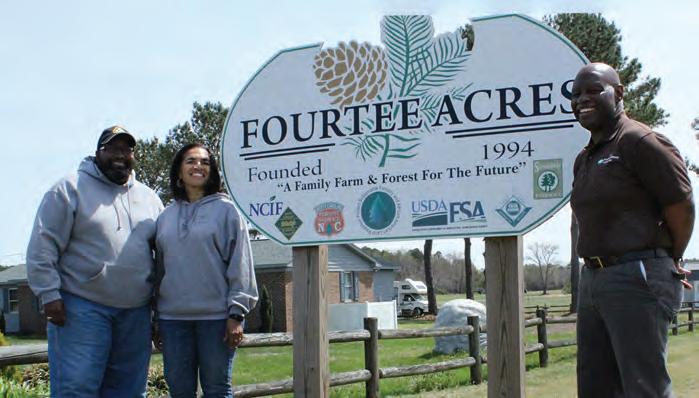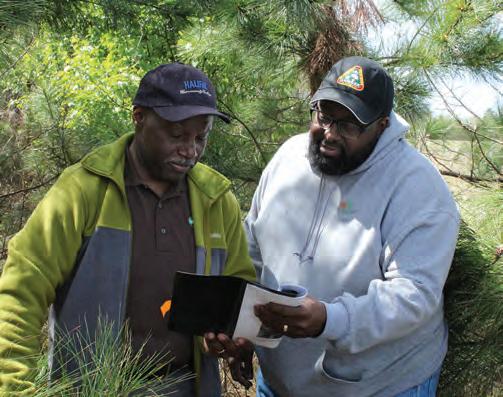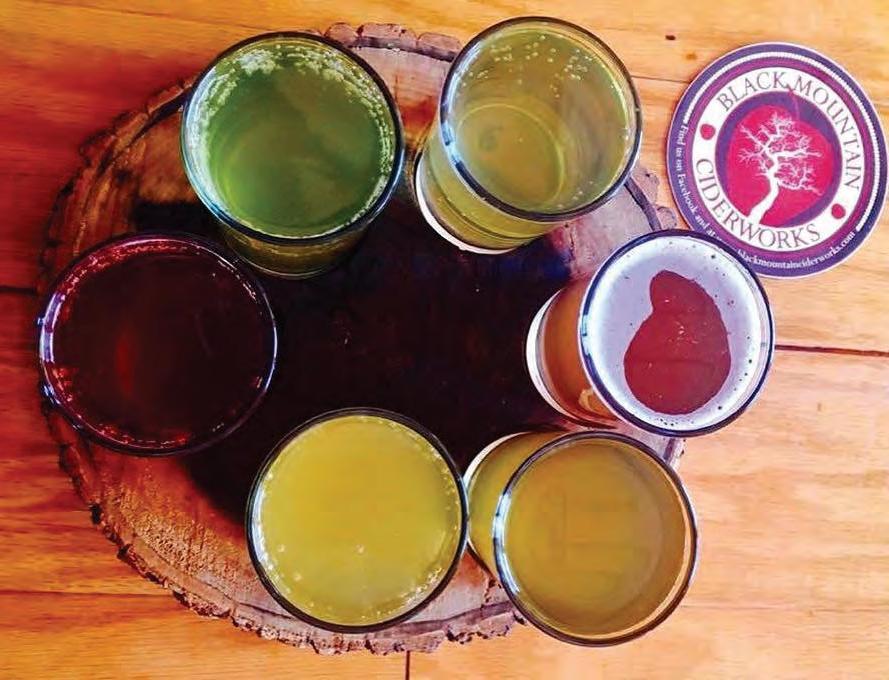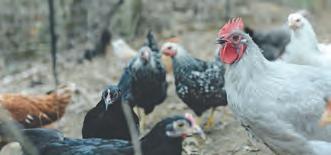
7 minute read
Viewpoints
from 2020-11-CCEC
THIS MONTH: The Food Issue
If 2020 has been good for anything, for many of us it’s been more time in the kitchen. In our annual Food Issue, we’re celebrating some of the goodness unique to kitchens around the state. And don’t miss a bit of inspiration for your own kitchen — our recipe section starts on page 32, and you can find 1,000 more on carolinacountry.com/recipes. —Scott Gates, editor
‘Mayberry’ Local I tremendously enjoyed reading the October 2020 Carolina Country article, “Greetings from The Real Mayberry” (page 10). The communities and businesses mentioned in the show and the article are very familiar and beloved to me, as I grew up in and still live in Mount Airy. In fact, I grew up in the neighborhood very close to Andy’s homeplace and within walking distance to “uptown” Mount Airy. My daddy went to school and church with Andy as a boy; the article provided some dear reminiscences of my childhood. Y’all really do need to visit Mount Airy/ Mayberry, and enjoy some of life as it was, should be, and sometimes still is — at the time of the show’s airing — a real breath of fresh air!
Debbie Benge, Mount Airy An employee of Surry-Yadkin EMC
Avid Reader October was a great issue ... I read it from cover to cover, as I do most issues. Thank you for interesting North Carolina articles.
Helen Pate, Holden Beach A member of Brunswick Electric From the Archives Back in April, Blue Ridge Energy member Teresa Miller reached out to see if we could find a back issue in the Carolina Country archives. Her uncle, John Nelson from Piney Flats, Tennessee, had drawn a picture from it and she had planned to frame it with the original. Our archives was inaccessible until recently, but sure enough, her Uncle John certainly did our April 1989 cover justice. The original featured an oil painting, “Rural Memories,” prepared especially for Carolina Country magazine by artist Pamela C. Renfroe.
Correction to our October issue Several photos from “Greetings from the Real Mayberry” (page 10) were taken by Marla Milling: shots of the Snappy Lunch sign and owner, as well as Wally’s truck. Thank you, Marla!
Contact us Phone: 919-875-3091 Fax: 919-878-3970 Mail: 3400 Sumner Blvd. Raleigh, NC 27616 Web: Email: carolinacountry.com editor@carolinacountry.com
Change of Address: carolinacountry.com/address Experiencing a power outage? Please contact your electric co-op directly to ensure prompt service. Visit carolinacountry.com/co-ops to find yours online.
(ISSN 0008-6746) (USPS 832800)
Read monthly in more than 700,000 homes Published monthly by
3400 Sumner Blvd., Raleigh, NC 27616 919-875-3091 carolinacountry.com
Warren Kessler Publications Director Scott Gates, CCC Editor Renee C. Gannon, CCC Senior Associate Editor Karen Olson House Contributing Editor Tara Verna Creative Director Erin Binkley Digital Media
Keith Alexander Advertising keith@carolinacountry.com
Joseph P. Brannan Executive Vice President & CEO Nelle Hotchkiss Senior Vice President & COO
North Carolina’s electric cooperatives provide reliable, safe and affordable electric service to 1 million homes and businesses. The 26 electric cooperatives are each member-owned, not-for-profit and overseen by a board of directors elected by the membership. Why Do We Send You Carolina Country Magazine? Your cooperative sends you Carolina Country as a convenient, economical way to share with its members information about services, director elections, meetings and management decisions. The magazine also carries legal notices that otherwise would be published in other media at greater cost.
Your co-op’s board of directors authorizes a subscription to Carolina Country on behalf of the membership at a cost of less than $5 per year. Has your address changed? Carolina Country magazine is available monthly to members of North Carolina’s electric cooperatives. If you are a member of one of these cooperatives but do not receive Carolina Country, you may request a subscription by calling Member Services at the office of your cooperative. If your address has changed, please inform your cooperative. Subscriptions: Individual subscriptions, $12 per year. $20 outside U.S.A. Schools, libraries, $6. Carolina Country is available on digital cartridge as a courtesy of volunteer services at the N.C. Department of Cultural Resources, Library for the Blind and Physically Handicapped, Raleigh, N.C. 888-388-2460. Advertising published in Carolina Country is accepted on the premise that the merchandise and services offered are accurately described and willingly sold to customers at the advertised price. The magazine, North Carolina Association of Electric Cooperatives, Inc., and the member cooperatives do not necessarily endorse the products or services advertised. Advertising that does not conform to these standards or that is deceptive or misleading is never knowingly accepted. Should you encounter advertising that does not comply with these standards, please inform Carolina Country at 3400 Sumner Blvd., Raleigh, NC 27616. 919-875-3091.
Carolina Country magazine is a member of American MainStreet Publications that collectively reach more than 27 million readers every month.
Periodicals postage paid at Raleigh, N.C., and additional mailing offices. Editorial offices: 3400 Sumner Blvd., Raleigh, N.C. 27616. Carolina Country® is a registered trademark of the North Carolina Association of Electric Cooperatives, Inc. POSTMASTER: Send all UAA to CFS. (See DMM 707.4.12.5); NON-POSTAL AND MILITARY FACILITIES: send address corrections to Carolina Country, 3400 Sumner Blvd., Raleigh, NC 27616. All content © Carolina Country unless otherwise indicated.


L to R: Fourtee Acres Farms owners Tyrone and Edna Williams with Roanoke Electric’s Alton Perry Alton Perry with Fourtee Acres Farms’ Tyrone Williams, a longtime participant in the project.
Equality Through Land Management Roanoke Electric program empowers Black members
By Victoria A. Rocha | Photos courtesy of the North Carolina Forestry Department
As the nation continues to reckon with issues of racial and social justice, a North Carolina electric cooperative’s sustainable forestry program has been quietly working to reverse decades of systemic discrimination against Black landowners.
Roanoke Electric Cooperative’s Sustainable Forestry and Land Retention Project is one of eight community-based organizations selected in 2013 to administer the national Sustainable Forestry and Black Land Retention program. The U.S. Endowment for Forestry and Communities created the program after decades of declines in Black farm ownership.
In 1920, Blacks owned between 16 million and 19 million acres of rural land and accounted for about 14 percent of the nation’s farmers. Today, they comprise less than 2 percent of farmers and own less than 5 million acres, according to data from the U.S. Department of Agriculture’s Census of Agriculture.
“In addition to discriminatory practices by agencies, African American landowners were denied access to resources because they weren’t informed of technical resources available to them or informational opportunities to learn the importance of estate planning to reduce the risk of heir property [land owned by two or more people in which there’s no will],” said Alton Perry, project manager at the Aulander-based co-op.
Perry and his staff help participants establish legal ownership of their properties to ensure that valuable land stays in their families. Landowners also learn forestry management techniques to transform unprofitable family farms and forests into economic assets.
Perry, who forged strong connections with public agencies and conservation advocacy groups during an
early career in forestry, hosts informational webinars, conferences and workshops attended by about 200 nearby landowners. He’s helped dozens gain access to agencies and other resources for forest management and estate plans. Perry estimates that, through this program, local landowners are implementing sustainable forestry and conservation practices on about 13,000 acres of land.
“Alton deserves a ton of credit for taking something from scratch and turning it into one of the best forest landowner programs in our area,” said Chris Brown, community relations manager at Enviva, a wood pellet manufacturer that operates nine plants in the Southeast, including two in Roanoke Electric’s service area. “He has a great ability to bring people together, from the industry to conservation folks to landowners.”
Enviva is one of two industry partners supporting the Roanoke Electric program with grants and technical assistance for landowners. Since 2017, it has given $50,000 in financial assistance for forestry and legal services and provided on-staff foresters to consult with participants at workshops or on their properties.
As for the landowners seeking assistance from the project, many have turned into skilled foresters; one was appointed to an advisory panel at a national conservation group. Others, like the Kyler family, who own forestland in Enfield, are just beginning.
“It has been a positive experience working with Roanoke Electric [REC],” the family said. “We’re now going through the process of finding out how much we own, what’s tillable, what’s farmable and what’s open. REC is really educating us on forestry and conservation. It’s one thing to own property, but something totally different to own property and cultivate it for the next generation.”







